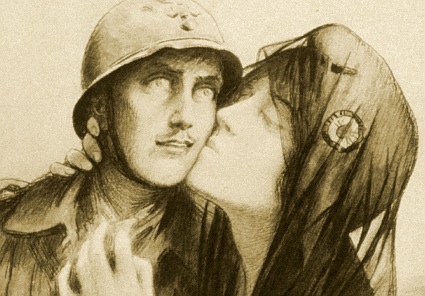Over at The Classic’s Club they like to publish a “Monthly Meme”, a monthly blogging prompt question for the member to participate in. This months question is
“What is your favorite ‘classic’ literary period and why?”
I’ll provide my answer and ask you guys to feel free to do the same!
If you’ve been reading this blog then you know that I like to play fast and loose with terms like “classic”. Maurice Sendak is classic, Orson Scott Card is classic, Neil Gaiman is classic. In the same way I’m gonna bend the rules in defining my idea of a “literary period” as well. I ask for immense grace on the part of the reader.
I’m not really a fan of any one particular genre or period in which great work has been done; my tastes span just about every style from every time period. However, if I had to choose one time period as being great for the arts, I would choose 1914 to 1945. That is to say, the time frame from the beginning of The Great War to the end of World War II.
It is a hard truth to swallow, but war encourages good art. War encouraged better politics, better philosophy, better religion, and better culture. Are these worth the price? They probably never could be, but for some reason we need war to sharpen our ideas into feasible, real-world scenarios. I use the word “need” here not as an absolute belief but based on cyclical, historic evidence.
War takes the extreme ideals of young men and forces upon them (and everyone else) the costs and consequences of those ideas. Throughout history cultures have come to radical political and philosophical conclusions and have seen them tested in action through various political upheavals. A world-wide war has the unique sobering effect of drastically changing and solidifying the most earnest opinions at the very heart of every man. The World Wars and the time between them were an era of intense and costly trial and error, a time when every man and women, whether identified now as aggressor, defender, or victim, was drastically solidified in a frame of mind that would haunt or direct the remainder of his or her earthly experience. Grandiose philosophical and political ideals would eventually be pulverized into crippling fear, stunning bravery, blinding hatred, and inspiring forgiveness and understanding. All of the destruction wreaked resulted very clearly in artistic revolutions of all kinds.
Concerning World War I, I think literarally of D.H. Lawrence, W. Somerset Maugham, Fitzgerald, Hemmingway, and T.S. Eliot among dozens of others. These are not necessarily known for war literature, but war imposed itself upon and transformed all in their craft. I consider C.S. Lewis and J.R.R Tolkien, destined to be friends as both fought through some of the most bloody and unsurvivable experiences of The Great War. Both lost most of their dearest friends, and even their more whimsical works are depicted with the sobriety of a man who has wrestled with war first-hand.
I consider the upheaved, unsettled time between the wars and the seemingly unavoidable onset of the Second World War. Another generation of men and women are rocked to their very cores, including Lee, Capote, Salinger, Vonnegut, Wouk, Mailer, and Lois Lowry among an entire generation in transition. Most rebelled against society at large, unable to cope with the unforeseen impacts that continue to ripple through culture today.
I especially think of the story of Ernest Hemmingway, already a revered author and now a war correspondent, meeting for drinks with a then-undiscovered J.D. Salinger, in a little house near the frontline in the midst of WWII. Young Salinger had carried a rough draft of the first six chapters of what would become The Catcher In The Rye stuffed in his jacket since before he landed on the beaches on D-Day and he had somehow found time to write and submit short stories to magazines from on the frontline. He had already built up a bit of a reputation with Hemmingway, and they spent a hearty evening together, drinking wine through the cold winter night and discussing the quality of Salinger’s work and literature in general. Before dawn they separated once more, and from what we know had very little interaction thereafter. Eventually, the elder would turn into a severe alcoholic before committing suicide, while the younger would seek solace in mystic religion and half a century of extreme reclusion.
While it can feel trite to explore the literary implications of the most destructive periods in world history, our art has more to say than anything else when we look to see how the minds of men are molded by these terrors. The lives of these artists, perhaps more so than their art at times, display the coping of humanity with unspeakable confusion. Some we find doubly moored to the foundations they already claimed, other finding some source of respite in the aftermath. So many others we find spiraling without answer, creating in the constant wake of the thousand-yard stare.

I’m often drawn to this type of literature too, but I’m searching for an answer to the vexing question of man’s inhumanity to man.
I hadn’t thought about how these extreme times in history also encourage authors to experiment.
Great post and welcome to the Classics Club 🙂
LikeLike
Thanks so much! I think we are still reaping the unforeseen and even unrecognized reprocussions of the World Wars in every area from family life to the arts.
I am really impressed by this when I read artist’s published diaries or personal letters. I am in the middle of Brother and Friends: An Intimate Portrait of C.S. Lewis by Major Warren Lewis. Both Lewis brothers fought in WWI and Warren was an officer during the Second World War. I also highly recommend The Letters Of J.R.R. Tolken. He dives pretty deep into his war-sculpted perspectives on human experience and creativity. Happy reading!
LikeLike